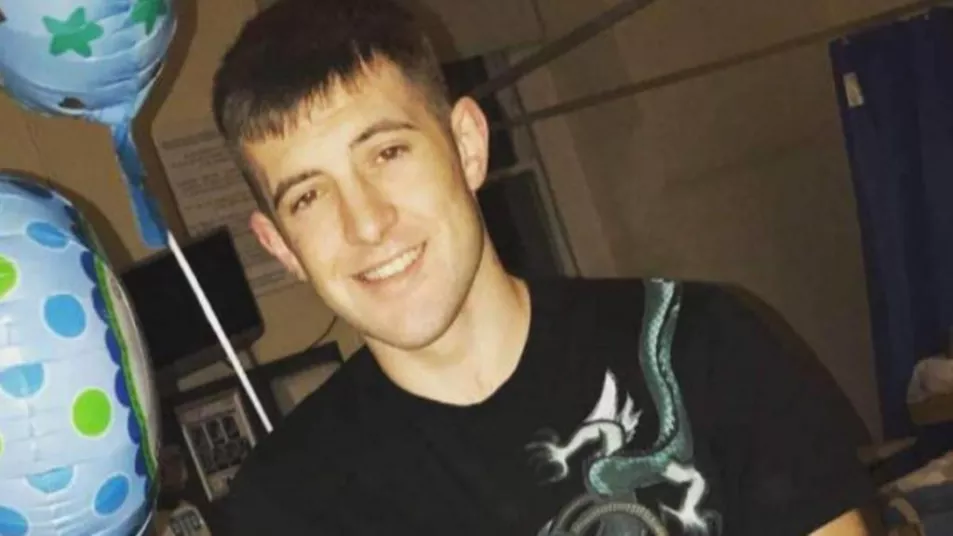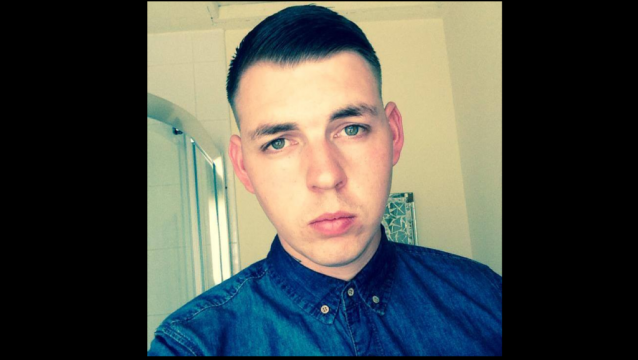"Extremely dangerous individual" Wayne Cooney (31), who shot a man dead while he pushed his four-month-old son in a pram, has been jailed for life for murder.
Before the trial of drug dealer Cooney, who was this week convicted of the murder of 22-year-old Jordan Davis, his lawyers argued that CCTV evidence that was vital in securing his conviction should be excluded from the evidence.
During Cooney's sentencing hearing on Friday, Mr Justice Tony Hunt called for the higher courts to put an end to "spurious" legal arguments which he said are causing a "shocking waste of public money".
He said the arguments regarding CCTV, which are made in "trial after trial", are "the most spurious arguments devised by man or beast".
He added: "Almost every trial is bedevilled by these arguments based on privacy which have nothing to do with the investigation of serious crime." The judge said he is not aware of any system in the world that would deny itself of CCTV evidence that can be used to further investigations into serious crime and to prosecute those responsible.
Calling on the Court of Appeal to rule on the use of CCTV, he added: "It is long overdue that the appellate courts put these arguments out in the garbage where they belong.
"The people who put them forward have no interest in privacy other than to prevent prosecution and detection. Privacy has nothing to do with investigations and prosecutions of serious crime and it is about time these barnacles were scraped from the boat."

Death a 'sad lesson'
The judge paid tribute to the work of An Garda Síochána for their "laborious and painstaking" work in finding and prosecuting Cooney.
He also commented that Mr Davis's death served as a "sad lesson" on the dangers of getting involved in drug crime. The trial heard that before the murder, a local drug dealer threatened to kill Mr Davis because the deceased owed him €70,000.
Although Mr Davis was involved in crime, Mr Justice Hunt said that should be dealt with by the police and courts and "not barbarians running around brandishing semi-automatic pistols and discharging them in the vicinity of innocent men, women and children."
He said Mr Davis had a right to life and his family, and society has the right to a "proper investigation and prosecution of this monstrous outrage".
Giollaíosa Ó Lideadha SC, who defended Cooney, said the arguments made during legal argument were not spurious and had been put forward by "conscientious counsel". Mr Justice Hunt agreed that counsel making the arguments had acted conscientiously. Mr Ó Lideadha also pointed out that the arguments put forward were supported by the Supreme Court and the European court.
Mr Justice Hunt sentenced Cooney to the mandatory term of life imprisonment for murder, saying that Cooney is "obviously an extremely dangerous individual". He said he should not be considered for release until that danger is negated "long in the future".
He noted that Cooney had fired eight times, striking Mr Davis three times, and was "astonishingly reckless" as to the danger posed to Mr Davis's baby and another child who happened to be cycling through the lane when Cooney opened fire.
Sentenced
The judge sentenced Cooney to 13 years each for possession of the firearm and ammunition he used to murder Mr Davis. Those sentences will run concurrently with the life sentence.
The court also heard that Cooney has 21 previous convictions including one for possession of drugs for sale or supply.
Before sentencing, Mr Davis's mother Sandra Davis described her son as "our gentle giant". She said: "We miss you so much, our hearts are broken without you."
She said the family would always talk about him to ensure that his young son "will always know how great you were. You were a great dad right up to the day you were taken from us in such a cruel way. He is like you in so many ways but has been robbed of your love. We were all robbed of your love."
She said that 'Jordo' loved big hugs and would always kiss her on the cheek when he saw her. "You had a smile that would light up a room and your life ended too soon," she said.
Cooney, with an address at Glenshane Drive in Tallaght, had pleaded not guilty to the murder of Jordan Davis (22) at a lane-way beside Our Lady of Immaculate National School in Darndale in Dublin on May 22nd, 2019.
He also pleaded not guilty to possessing a 9mm semi-automatic pistol and to possessing ammunition in circumstances that give rise to the reasonable inference that he did not have them for lawful purposes. A jury took just a little over three hours to find him guilty following a trial that ended earlier this week.
Evidence in trial
The prosecution alleged that Mr Davis owed €70,000 to a local drug dealer, identified only as CD in the trial, who was the brother of Cooney's then girlfriend.
When Mr Davis's mobile phone was examined by gardaí they found a message from CD warning Mr Davis: "I'm on your case mate, it won't be long," and later telling him: "Soon, very soon, bang bang."
Prosecution barrister Bernard Condon SC told the jury that the circumstantial evidence against Cooney was such that he was either the shooter or the "most unlucky person ever".
A garda had identified Cooney from CCTV footage as the cyclist circling Mr Davis. Cooney's DNA was found on a glove in an area on Belcamp Lane where the shooter could be seen discarding gloves and a black body warmer minutes after the shooting.
Cooney was also identified returning to the same area to retrieve the body warmer about one hour and 20 minutes after the shooting.
The prosecution also relied on mobile phone evidence that showed Cooney's phone was calling CD at moments when the person identified on CCTV as the shooter could be seen holding a phone to his ear.
This was the first trial in which the use of mobile phone evidence was contested following a ruling by the Court of Justice of the European Union which found that Ireland's system of retaining and accessing mobile phone data was a breach of privacy rights.
Mr Justice Hunt allowed the mobile phone evidence, saying the "weighty public interest and common good associated with the need to properly investigate this murder comprehensively outweighed any limited privacy rights attaching to the data."
CCTV
After the murder the shooter's movements were tracked by CCTV as he walked to a nearby bus-stop. Witness Stacey Hayes told the trial that at the same time she was driving around Darndale with Cooney's girlfriend, identified only as EF.
EF was speaking to someone on the phone and directed Ms Hayes until they came to the same bus stop where EF said, "there's the idiot" and told Ms Hayes to pull in. Ms Hayes said she recognised the person who got into her car as EF's boyfriend Cooney.
She denied to Cooney's defence barrister Giollaíosa Ó Lideadha SC that criminals had put pressure on her to make a false allegation against Cooney.
Mobile phone evidence showed that Cooney's phone was on a call to EF's phone for 200 seconds at the exact time Ms Hayes said EF was directing her to the bus stop while speaking to someone on the phone.
Cooney denied to gardaí that he was the person on the bicycle or that he was the shooter. Mr Ó Lideadha told the jury that the prosecution case contained "large holes" and did not amount to proof beyond reasonable doubt.
He said there could have been a number of people who had a motive to murder Mr Davis and he questioned the credibility of the garda who identified Cooney from CCTV footage. He further questioned the prosecution's claim that they had proven that the mobile phone belonged to Cooney.
The jury's verdict is likely to be appealed. During legal argument Mr Ó Lideadha described the judge's charge to the jury as "the complete negation of a fair trial". He indicated that if the case goes to the appeal court he will make submissions regarding the judge's presentation to the jury.
Drugs
Mr Davis's mother, Sandra Davis, told the trial that she knew her son was dealing drugs when he started buying expensive clothes and going to Amsterdam. He spent over €1,000 on a buggy when his son was born.
She said things started to "go downhill" after January 2019 when her son's "so-called friends" all disappeared. In March that year five men appeared in her garden. One of them shouted at Ms Davis: "Tell Jordan to pay his f*cking bills, it's not over, tell Jordan we'll be back." That night the windows of the house were smashed, she said.

By May 2019 she said her son "seemed to believe that things were okay" and he began to relax. "He sorted it out, he said he sorted it out," she said. She agreed that he had been friends with Sean Little, who was shot dead one day before her son.
During a separate investigation into CD, gardaí discovered a drug dealer's "tick list", which contained names of people who owed money to CD. Gardaí identified a person owing €70,000 and marked as "Jordo" as being Jordan Davis.
In a lengthy charge to the jury, Mr Justice Hunt said if they were satisfied beyond a reasonable doubt that Cooney was the cyclist who came up behind Jordan Davis and shot him, they must find him guilty of murder.
He told them that the gunman who cycled up behind Mr Davis and shot him dead was "undoubtedly guilty of murder" but the issue for them to resolve was whether the cyclist was Wayne Cooney.
Mr Justice Hunt told the jury that if the prosecution failed to prove beyond a reasonable doubt that Cooney murdered Mr Davis, they could find that he impeded the arrest or prosecution of the murderer by taking away the body warmer.

He said that, by his own admission, Cooney was seen on CCTV at Belcamp Lane about one hour and 20 minutes after the murder.
He said the shooter disposed of the body warmer during a 40-second period when he was off-camera and when Cooney retrieved the body warmer, he also went off camera for almost exactly 40 seconds.
He said the jury should consider that if Cooney was not the person who left the body warmer, he must have acquired some knowledge that it had been put there. He added: "If he didn't do the shooting, he acquired the knowledge of where the item was in that hour and 20 minutes. That has to be considered by you."
On this view, Mr Justice Hunt said Cooney was not the shooter but might have been "covering up". He further told the jury: "If he didn't do the shooting, he didn't get to the lane-way by accident. There had to be some information that brought him there, he had to know something about what he was retrieving and where he was retrieving it from."







